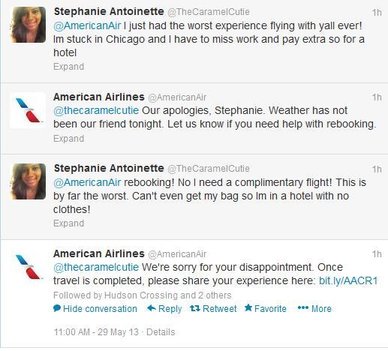Social media tracking tools are useful, but don’t forget the human touch
When it comes to managing and measuring a brand’s reputation online today, it should not be a case of one-size fits all. Analytics tool can help assess sentiment towards a brand, but personal human involvement is important too.
The task of managing reputation online is multilayered. A critical element is monitoring the way conversations – be they general feedback, a reaction to a company’s initiative or identifying an opportunity to strengthen ties - around a brand are shaping up. Social media teams have to respond in real-time as they assess conversations. Of course, there is scope for using analytics to address the vast amount of social content as well as the variety of formats (text, audio and video). For instance, sentiment analysis has made steady progress when it comes to evaluating reputation.
EyeforTravel’s Ritesh Gupta talks to Piper Stevens, director of social media, Loews Hotels & Resorts, about managing reputation, sentiment analysis and how best to approach feedback on TripAdvisor, Facebook and Twitter.
EFT: How do you manage your reputation on social media?
PS: As an organisation, Loews Hotels takes reputation management very seriously, and in the digital age that we live in, we’ve found that we need to have an `all-hands-on-deck’ approach to mitigate potential issues in a timely manner.
We have enlisted several web solutions to ensure our property teams have the tools they need to efficiently track and manage reputation, and we evaluate our progress on a monthly basis.
Furthermore we make sure we involve and solicit input from our operators, PR, and marketing departments based on the particular situation. It’s critical to have a collaborative programme to cover the various aspects of our brand reputation.
EFT: How do you track social media sites or platforms?
PS: We utilise one web solution to track a number of review sites, travel sites, and forums, and we use another solution to monitor traditional social media sites like Facebook, Twitter, and so on.
EFT: Tools that analyse sentiment are improving. How effective are these in monitoring how your brand is faring in the social media arena?
PS: It’s a multi-pronged process. From an automated perspective, we feel that our (social) reputation tools do a fairly good job of analysing the true sentiment, but we also recognise that as sophisticated as these tools are today, they are still making a programmed call based on code. We feel that it will always be important for our team members to review the social conversations and reviews themselves to ensure we are in tune with what our guests are truly saying. The impact of having that knowledge first-hand cannot be replaced with a report or general sentiment score.
Exceeding guest expectations is many times accomplished through small nuances that truly delight them, and information gleaned through reviews can better prepare our property teams for delivering those one-of-a-kind experiences on a broader level.
EFT: How would you differentiate between a review on TripAdvisor vis-à-vis feedback given on Twitter and Facebook?
PS: Here are some observations:
· Generally speaking, TripAdvisor reviews are geared to be narrower in scope, directly correlated to the services and the hotel product itself. I feel they surface more actionable items for the operators, and thus the GM’s of the hotels pay far more attention to a TripAdvisor review. And although Twitter and Facebook posts also surface direct service and product opportunities, they often go beyond this scope and can offer more diverse insight to the consumers’ profile and make-up.
· In addition, guests that are still on property are more likely to take to Twitter and Facebook to ask questions or site an issue, whereas TripAdvisor reviews mainly stay to reflect post stay impressions.
· Another notable difference is that the shelf life of guest comments on Twitter or Facebook is relatively short in comparison to a TripAdvisor review which could have a direct impact on a property's business for a longer duration of time. With TripAdvisor, we focus on thoughtful review responses from management that directly address any issues the guest had with their stay. We recognise how critical TripAdvisor is these days to driving conversion and confidence.

EFT: Revenue management executives will stay that a hotel’s rank on TripAdvisor has a direct impact on pricing strategy. Can you share concrete benefits of having a high-ranking review?
PS: There are industry studies that have shown the correlation between online reputation and revenue strategies; intuitively this makes sense. However, from a true scientific understanding of what a high rank or a great social reputation is equal to in terms of a premium pricing opportunity or price elasticity, I don't think the industry is there yet - both in terms of human applications or automated Revenue Management Systems.
I imagine that a company could perform a multivariate testing of sort to gain some basic insight. However, at minimum hotel operators should consider their reputation rankings in line with their brand equity in formulating their pricing strategy.

